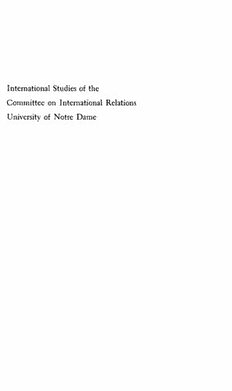
The Volunteer Army and the Allied Intervention in South Russia, 1917-1921: A Study in the Politics and Diplomacy of the Russian Civil War PDF
Preview The Volunteer Army and the Allied Intervention in South Russia, 1917-1921: A Study in the Politics and Diplomacy of the Russian Civil War
International Studies of the Committee on International Relations University of Notre Dame The Volunteer Army and Allied Intervention in South Russia, 1917-1921 THE VOLUNTEER ARMY and A Study in the Politics and Diplomacy of the Russian Civil W ar ALLIED INTERVENTION IN S O U T H RUSSIA, 1917-1921 By George A. Brinkley UNIVERSITY OF NOTRE DAME PRESS • 1966 Copyright © 1966 by University of Notre Dame Press Notre Dame, Indiana Library of Congress Catalog Card Number: 66-15501 Manufactured in the United States TO ANN PREFACE The Russian civil war and the accompanying Allied intervention from 1917 to 1921 have long been recognized as major events in the great upheaval which was unleashed by World War I. Yet today, almost half a century after these events, they remain less than fully analyzed or even chronicled. One of the reasons for this situation lies in the extreme complexity of the international struggle which took place on the territory of the former Russian Empire. Armies, political parties, and ideological issues proliferated rapidly in the virulent breeding ground created by the collapse of both political order and established value systems in Russia. Moreover, the international prob lems of the first World War in history served to complicate further any question thrown up by the general catastrophe. War, civil war, and foreign intervention were not new phenomena in world history in 1917, of course. Not even their simultaneous appearance at the same focal point of international politics was un precedented. But now this combination of international crisis patterns took place in the context of a revolutionary transition affecting the traditional structure of diplomacy and international law and putting radically opposed ideologies at the center of political action. The resulting confusion, imposed on Europe by the breakdown of the old order, put into question many of the legal and moral foundations of the existing state system. Governments had for the first time been obliged to marshal all of the resources of the nation in a massive effort IX x 'The Volunteer Army which, with it all, led not to quick victory but to virtual collapse for all of the belligerents. It was in this state of stress that Russia experienced a military and political paralysis, and her allies, Britain and France, were faced with the prospect of losing a partner considered essential to victory. The deterioration of Russian power before the March Revolution of 1917 was a serious blow to the Entente in the war against Germany. It became a crisis of major proportions when the Bolsheviks seized con trol of the state in November 1917 and immediately issued a call for peace to be brought about by popular revolution in all of the bellig erent countries. By November 1918, when World War I ended, Rus sia was in the throes of an all-embracing civ il war, and the Allies were committed to a variety of forces which had remained loyal to the Entente and now sought a continuation of aid to overthrow the Bolshevik regime. With the Armistice in November 1918, some Allied spokesmen argued that all reason for continuing the intervention had ended, while others pointed to an obligation to stand by those forces in Rus sia to whom commitments had already been made and stressed the importance of the anti-Bolshev ik war as a necessary part of the strug gle to restore peace and order to Europe. Choice between these two points of view was extremely difficult for the Allied governments. The intervention, undertaken initially simply as a means to continue the war against Germany, would require a much broader range of policy decisions after November 1918. but such decisions were made only haphazardly, if at all. The Allies, trying to treat the Russian problem as merely a final battle of World War I, tended to evade the responsi bility which inevitably accompanied the continuation of the inter vention in a revolutionary situation. They thus neither conspired to make an all-out military effort nor consistently pursued the oppor tunities for peacemaking. Meanwhile the Russian civil war grew into a major conflict. The first important resistance to the Bolshevik regime had come chiefly from two elements: from a variety of socialist parties which rejected Bolshevik policies and from the non-Russian borderlands which de manded autonomy. The most important of the latter, the Ukraine and Transcaucasia, were initially also led bv socialists, although the Cossack areas, which also resisted Bolshevik encroachment, tended toward more conservative leadership. The first real turning point for the major groups in both of these elements of opposition was the dis-
